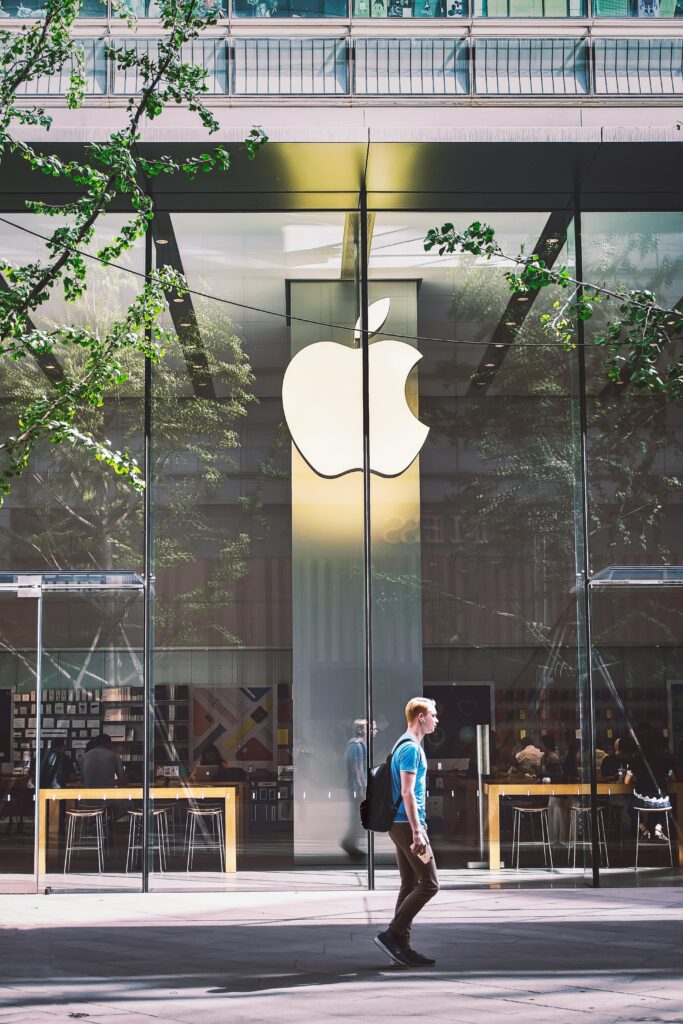The Justice Department has accused Apple of unfair practices, focusing on antitrust violations and market dominance issues. The lawsuit filed highlights concerns about hindering fair competition in the industry. Allegations include blocking “super apps” on iPhone, limiting cloud gaming services, and imposing restrictions on non-Apple products. The U.S. Attorney General stresses the need to protect consumers and address competition worries. Apple’s defense emphasizes innovation and enhancing user experiences. The matter raises significant implications for the tech industry landscape. To gain a deeper understanding of the situation and responses, continue exploring the details of the accusations and counterarguments.

Allegations Against Apple
The accusations revolve around Apple’s market dominance and potential antitrust violations. The lawsuit contends that Apple has utilized its position to stifle competition and extract more revenue from stakeholders.
Filed in the United States District Court for the District of New Jersey, the case asserts that Apple’s unfair tactics have solidified its smartphone dominance, creating barriers for other companies.
The focus is on how Apple’s actions may have hindered a fair playing field within the industry, prompting the Justice Department to seek remedies for any harm caused by the alleged anticompetitive behavior.
Tactics Alleged by the Justice Department
Alleged tactics by the Justice Department include Apple’s blocking of super apps that facilitate switching from iPhones. These actions are viewed as antitrust violations aimed at maintaining Apple’s dominance in the smartphone market.
By banning cloud gaming services, limiting messaging app interoperability, restricting non-Apple smartwatch compatibility, and preventing tap-to-pay feature access for other digital wallets, Apple is accused of unfairly stifling competition. Such tactics hinder consumer choice and innovation, potentially creating barriers for alternative products and services.
The Justice Department’s scrutiny of Apple’s tactics underscores the concern over potential anticompetitive behavior in the tech industry, with a focus on ensuring fair practices and a level playing field for all market participants.
Unfair Practices Highlighted in the Lawsuit
Highlighted in the lawsuit are Apple’s contentious business practices that allegedly hinder fair competition in the smartphone market. Apple’s imposition of limits on developers through contracts and fees raises concerns about developers’ rights.
By selectively blocking third-party apps from connecting with the iPhone system, Apple may be limiting consumer choice and innovation. The collection of a 30% commission on app downloads and in-app purchases also raises questions about consumer protection.
The Department of Justice seeks an injunction to address these alleged anticompetitive practices and provide relief for any harm caused. Ensuring an important playing field for developers and safeguarding consumer interests are vital aspects that the lawsuit aims to address in the smartphone market.
U.S. Attorney Generals Statements
The U.S. Attorney General’s remarks underscore the critical need to safeguard consumer interests and fair competition in the smartphone market. Competition concerns and market dominance are at the forefront of the allegations against Apple. Below is a table analyzing the implications of the Justice Department’s lawsuit:
| Concerns | Implications |
|---|---|
| Higher prices | Consumers may bear the brunt of antitrust violations |
| Monopoly power | Apple’s alleged violation of antitrust laws |
| Strengthened monopoly | Apple could further solidify smartphone dominance |
| Harming competition | Lawsuit seeks to prevent detrimental practices |
| Anticompetitive harm | Relief sought to remedy any negative impact |
These points emphasize the significance of addressing the issues raised by the lawsuit to guarantee a competitive and fair marketplace for smartphone users.
Apples Response to the Lawsuit
In response to the lawsuit filed by the United States Justice Department, Apple has asserted that the allegations stem from a misunderstanding and are based on an unsubstantiated legal theory. Apple’s defense focuses on maintaining its innovative practices and dedication to enhancing user experiences. The legal implications of this case could set a precedent for future antitrust actions against tech giants.
Apple’s response highlights the potential impact on its product design and core principles. The company warns of the broader implications this lawsuit could have on the technology industry as a whole.
- Emphasis on innovation and user experience
- Potential threat to product design and principles
- Warning of dangerous precedents
- Legal implications for antitrust actions
- Impact on the technology industry
The accusations of anticompetitive behavior and unfair practices leveled against Apple by the Justice Department raise concerns about the company’s market dominance and its impact on competition and innovation.
The lawsuit highlights the necessity for regulatory scrutiny in the tech industry to guarantee fair practices and safeguard consumer welfare.
The result of this legal battle will probably have extensive implications for Apple and the broader ecosystem of smartphone technology.